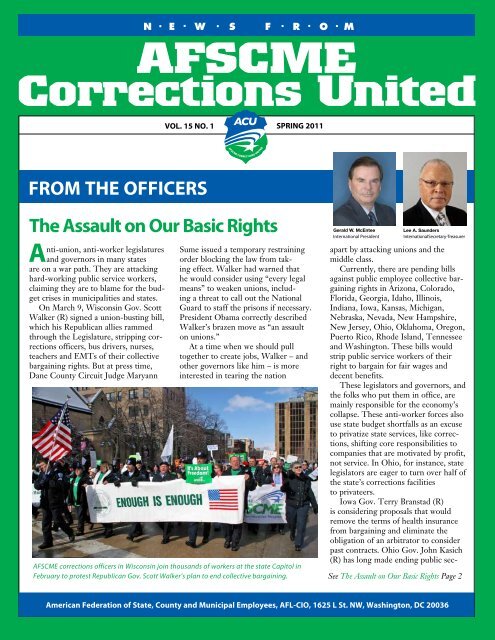Spring 2011 ACU Newsletter The Assault on Our Basic ... - AFSCME
Spring 2011 ACU Newsletter The Assault on Our Basic ... - AFSCME
Spring 2011 ACU Newsletter The Assault on Our Basic ... - AFSCME
Create successful ePaper yourself
Turn your PDF publications into a flip-book with our unique Google optimized e-Paper software.
Photo: Joe Weidner<str<strong>on</strong>g>The</str<strong>on</strong>g> <str<strong>on</strong>g>Assault</str<strong>on</strong>g> <strong>on</strong> <strong>Our</strong> <strong>Basic</strong> Rightsc<strong>on</strong>tinued from Page 1Mexico, Pennsylvania, Tennessee,Washingt<strong>on</strong> and West Virginia. <str<strong>on</strong>g>The</str<strong>on</strong>g>semeasures, now in effect in 22 states,undermine wages for all workers anddestroy the best job security protecti<strong>on</strong>that exists: the uni<strong>on</strong> c<strong>on</strong>tract. Underthese laws, workers in uni<strong>on</strong>ized settingswould benefit from the uni<strong>on</strong>’svictories without sharing in the cost ofrunning the uni<strong>on</strong>.Now is the time to fight back likenever before. We have already started acampaign to recall eight GOP senatorsin Wisc<strong>on</strong>sin and hold them accountableat the ballot box.But Wisc<strong>on</strong>sin is <strong>on</strong>ly the beginning.We’re in this fight for the l<strong>on</strong>g haul.<str<strong>on</strong>g>The</str<strong>on</strong>g> attack against public service workers— wherever our sisters and brothersare threatened — is an attack against<strong>AFSCME</strong> members everywhere. Visitafscme.org, to find out how you canjoin the fight.We’ve got to mobilize the powerthat comes from speaking with <strong>on</strong>eclear voice. Each of us must be fullyengaged in a unified effort for the goodof every <strong>AFSCME</strong> member, for thegood of working families and thegood of our nati<strong>on</strong>.Verneta Clark, a member of <strong>AFSCME</strong>Ohio Retiree Chapter 1184, and the firstfemale employee at the Southern OhioCorrecti<strong>on</strong>al Facility in Lucasville, joinedher sisters and brothers at the Statehouserally <strong>on</strong> Feb. 22.tor collective bargaining a priority. Hehas threatened to fire striking publicservice workers and do away with bindingarbitrati<strong>on</strong>. In March, Kasich signedS.B. 5, which would eliminate collectivebargaining for state workers.Right-to-work laws – designed toweaken uni<strong>on</strong>s – are currently beingc<strong>on</strong>sidered in Alaska, C<strong>on</strong>necticut,Hawaii, Indiana, Maine, Maryland,Michigan, Minnesota, Missouri,M<strong>on</strong>tana, New Hampshire, NewPhoto: Greg Dix<strong>on</strong>Marching in fr<strong>on</strong>t of the state Capitol in Madis<strong>on</strong>, <strong>AFSCME</strong> correcti<strong>on</strong>s officerswave to cheering supporters.Kentucky COs Gain RightsApproximately 5,000 Kentuckycorrecti<strong>on</strong>s officers and employeeswho work in pris<strong>on</strong>s and relatedfacilities (<strong>AFSCME</strong> Council 62) havefinally w<strong>on</strong> their first uni<strong>on</strong> agreementwith the state. During a time whengovernors across the country work toeliminate collective bargaining rights,the victory is particularly important.<str<strong>on</strong>g>The</str<strong>on</strong>g> agreement, signed recently byGov. Steve Beshear (D), is even moresignificant because Kentucky stateworkers do not currently have the collectivebargaining rights, which allowworkers to negotiate wages, benefits andworking c<strong>on</strong>diti<strong>on</strong>s. Now, at least, thoseworkers covered by the agreement willbe represented by a uni<strong>on</strong> steward ingrievance procedures, and in meetingswith management that could lead todisciplinary acti<strong>on</strong>s.<str<strong>on</strong>g>The</str<strong>on</strong>g> agreement also establishes a newlabor-management process allowingworkers to bring up issues and c<strong>on</strong>cernsoutside the grievance procedures.Meetings between COs and the wardenof the Kentucky State Penitentiary havealready resulted in c<strong>on</strong>crete soluti<strong>on</strong>s tosafety problems, such as the purchaseof radios and other equipment, andimprovements to the teleph<strong>on</strong>e system.David Warrick, executive directorof Council 62 and an Internati<strong>on</strong>al vicepresident, commended the governorfor his str<strong>on</strong>g support of collectivebargaining: “This is a tremendous stepSee Kentucky COs Gain Rights Page 32 <str<strong>on</strong>g>Spring</str<strong>on</strong>g> <str<strong>on</strong>g>2011</str<strong>on</strong>g>
Correcti<strong>on</strong>s Officers Speak OutPhoto: Charlie WishmanState Workers are Taxpayers, Too! by Thomas BradfieldI’ve neverhad my headbashed with amailbox or trashcan. I’ve neverbeen stabbed orpunched so hardthat it requiredseveral surgeries to repair the damage.But many of my co-workers have.Every morning, men and women inIowa walk into a workplace and w<strong>on</strong>derif they’ll be going home that night.Danger stalks them even after theyleave. Many have ended up divorcedor c<strong>on</strong>sumed by addicti<strong>on</strong>s becauseof stress. Faced with c<strong>on</strong>stant threats,they always walk with a guarded eye.<str<strong>on</strong>g>The</str<strong>on</strong>g>ir stories seldom make fr<strong>on</strong>t-pageheadlines because “What happens <strong>on</strong>the mile, stays <strong>on</strong> the mile.” It comeswith the territory.<str<strong>on</strong>g>The</str<strong>on</strong>g>se are the officers of the IowaDepartment of Correcti<strong>on</strong>s. <str<strong>on</strong>g>The</str<strong>on</strong>g>yperform a public service many cannot.<str<strong>on</strong>g>The</str<strong>on</strong>g>y place their lives <strong>on</strong> the line toensure that the citizens of Iowa are safe.<str<strong>on</strong>g>The</str<strong>on</strong>g> people’s interests are always <strong>on</strong>our minds when we negotiate a c<strong>on</strong>tract.This past year al<strong>on</strong>e, we votedto open up c<strong>on</strong>tracts to accept a weekof mandatory unpaid days and thetemporary eliminati<strong>on</strong> of deferred compensati<strong>on</strong>allotments due to the budgetcrisis. This is unheard of.Yet, state employees c<strong>on</strong>tinue to beused as scapegoats by politicians whoblame us for problems we have no c<strong>on</strong>trolover. <str<strong>on</strong>g>The</str<strong>on</strong>g>y begrudge us a 2 percentraise in salary and affordable healthcare. You’d think that’s the least theycan do for the men and women whorisk their lives every day.<str<strong>on</strong>g>The</str<strong>on</strong>g>se are the workers of Iowa whoproudly serve the public <strong>on</strong> the fr<strong>on</strong>tlines. Do not punish them for they aretaxpayers, too.Bradfield is a correcti<strong>on</strong>s officer at the Mt.Pleasant Correcti<strong>on</strong>al Facility in Iowa, and amember of Local 2985 (Iowa Council 61).Reprinted from www.press-citizen.com,Jan. 29, <str<strong>on</strong>g>2011</str<strong>on</strong>g>Photo: OCSEA Comm. Dept.Uni<strong>on</strong>s Care About Ohio by Gary ShepherdFor 13 years,I’ve been ahard-workingstate employeein the Dept. ofRehabilitati<strong>on</strong>and Correcti<strong>on</strong>s.I know that <strong>on</strong>eof the biggest sacrifices of working inthe public sector is the compromiseand give-and-take involved.State employees’ ability to compromisein hard times hasn’t wavered. In24 years of collective bargaining, we’venegotiated for better wages and benefitsand other issues like health and safety.We’ve never taken a strike vote. We’ve<strong>on</strong>ly used binding arbitrati<strong>on</strong> or “c<strong>on</strong>ciliati<strong>on</strong>”<strong>on</strong>ce and, when we did, thearbitrator did not go our way.My uni<strong>on</strong> has stood side-by-sidewith the state of Ohio for decadesworking to find soluti<strong>on</strong>s to the state’sec<strong>on</strong>omic problems. <strong>Our</strong> latest c<strong>on</strong>tractsaved the state $250 milli<strong>on</strong>. We’veachieved hundreds of milli<strong>on</strong>s in savingsdue to joint quality initiatives, ashared approach to administrative servicesand a collaborative approach tokeeping health care costs in line.My uni<strong>on</strong> cares about Ohio and sodo I. That’s why I’m proud to come towork every day.Shepherd is a correcti<strong>on</strong>s officer in Portsmouth,Ohio, and a member of Local 7330, Ohio CivilService Employees Associati<strong>on</strong> (OCSEA).Reprinted from Portsmouth Daily Times,Jan. 15, <str<strong>on</strong>g>2011</str<strong>on</strong>g>Kentucky COs Gain Rightsc<strong>on</strong>tinued from Page 2in building a str<strong>on</strong>g uni<strong>on</strong>,” Warricksaid. “As state employees, we now havewritten rules and rights that cannotbe changed unilaterally <strong>on</strong> any givenday at the whim of management. Thisagreement lays a solid foundati<strong>on</strong> forexpanding those rights for years tocome.”Adds Derrick Lloyd, a CO at theKentucky State Penitentiary and a memberof Local 752, Council 62, “Thisagreement is very important to us,”he explains. “It’s not just the representati<strong>on</strong>that matters. But with avoice at work, we now have a measureof power to improve the livesof our members who make greatsacrifices every day <strong>on</strong> the job.”<str<strong>on</strong>g>The</str<strong>on</strong>g> agreement also covers some4,000 social service employees, includingfamily case workers and managersand social workers.Kentucky Gov. Steve Beshear (D) signs tw<strong>on</strong>egotiated uni<strong>on</strong> agreements coveringapproximately 9,000 correcti<strong>on</strong>s andsocial service workers.Photo: J<strong>on</strong> MelegritoNews From <strong>AFSCME</strong> Correcti<strong>on</strong>s United 3
Pushing Back the PrivateersPhoto: Jan Underwood/Dayt<strong>on</strong>DailyNewsCorrecti<strong>on</strong>s officers from Ohio’s Dayt<strong>on</strong> Correcti<strong>on</strong>al Instituti<strong>on</strong> call their state representativesto protest Senate Bill 269, which would privatize half of the state’s pris<strong>on</strong>s.Like correcti<strong>on</strong>s officers and otherpublic service workers across thenati<strong>on</strong>, Ohio COs are in for a fight.With two of 31 state-owned facilitiescurrently in private hands, Sen. TimothyGrendell (R-Chesterland) introduced abill last year that would privatize at least13 more pris<strong>on</strong>s. Although the bill diedin committee, Grendell is likely to bringit back again.When John Kasich w<strong>on</strong> the governor’sseat last November, the situati<strong>on</strong>got worse. He vowed to target the pris<strong>on</strong>system as a way to save m<strong>on</strong>ey. In histwo-year budget submitted in March, heproposed selling off five state pris<strong>on</strong>s toNo-layoff Agreement Ratified<strong>AFSCME</strong> COs at Illinois’ SheridanCorrecti<strong>on</strong>al Center, who had g<strong>on</strong>ethrough a facility closure and a l<strong>on</strong>gbattle to get the pris<strong>on</strong> re-opened, votedoverwhelmingly for a new agreementwith the state that will bar layoffs andfacility closures through June 30, 2012.<str<strong>on</strong>g>The</str<strong>on</strong>g> uni<strong>on</strong> and management agreedthat some $20 milli<strong>on</strong> in savings couldbe achieved by adopting some of theoperati<strong>on</strong>al efficiencies submitted byemployees, such as improving operati<strong>on</strong>sin Correcti<strong>on</strong>s Industries andmaking energy-efficiency modificati<strong>on</strong>sat correcti<strong>on</strong>s facilities.raise $200 milli<strong>on</strong>.Kasich has chosen a former officialof Correcti<strong>on</strong>s Corporati<strong>on</strong> of America(CCA) to run the Ohio Department ofRehabilitati<strong>on</strong> and Correcti<strong>on</strong>s. He hasalso threatened to do away with bindingarbitrati<strong>on</strong> and fire public service workerswho go <strong>on</strong> strike.But Ohio’s COs are fighting back, not<strong>on</strong>ly against privatizati<strong>on</strong> but also againstattempts to end collective bargaining.<str<strong>on</strong>g>The</str<strong>on</strong>g>y’re taking <strong>on</strong> the governor and hiscr<strong>on</strong>ies, attending a series of protest ralliesand acti<strong>on</strong>s, testifying at hearingsand lobbying the state Legislature.Last year, when Grendell filed his bill,“Wehave forgeda groundbreakingagreementthat offersprotecti<strong>on</strong>againstjob loss for<strong>AFSCME</strong>members instate government,”says Council 31 Exec. Dir.Henry Bayer, also an Internati<strong>on</strong>al vicepresident. “Later next year, we will getPhoto: Council 31S.B. 269, COs flooded state legislators’offices with ph<strong>on</strong>e calls to protest whatthey denounced as a “reckless plan.”Joined by other members of the OhioCivil Service Employees Associati<strong>on</strong>(OCSEA), COs pushed back, mobilizingmore than 3,000 members to writeletters urging their representatives tostand up against the private pris<strong>on</strong> plan.“We will fight this with every resourcewe have,” said OCSEA Pres. EddieParks who is also an Internati<strong>on</strong>al vicepresident. “At a time when Ohioansare already hurting from the loss ofthe state’s manufacturing base, it’s thewr<strong>on</strong>g time to eliminate good payingjobs and replace them with lowerwage work.”Am<strong>on</strong>g those who led a massive correcti<strong>on</strong>scall-in day was Joanie Hunter,Chapter 5725 president of the Dayt<strong>on</strong>Correcti<strong>on</strong>al Instituti<strong>on</strong> and a memberof OCSEA. “Private pris<strong>on</strong>s are not heldto the same standards as a publicly-runinstituti<strong>on</strong>, so it would be devastating toour community,” she said. “For-profitpris<strong>on</strong>s diminish safety because theyhave higher turnover rates and decreasedtraining as a result of the corner cuttingthat comes with profit making.”She adds: “Legislators who werepushing for privatizati<strong>on</strong> failed to provethat it would save costs. <str<strong>on</strong>g>The</str<strong>on</strong>g> two pris<strong>on</strong>salready in private hands are not savingthe state any m<strong>on</strong>ey at all.”down to work <strong>on</strong> a new collective bargainingagreement in <strong>on</strong>e of the worstec<strong>on</strong>omic climates in which our negotiati<strong>on</strong>shave ever taken place.”4 <str<strong>on</strong>g>Spring</str<strong>on</strong>g> <str<strong>on</strong>g>2011</str<strong>on</strong>g>
Correcti<strong>on</strong>s Uni<strong>on</strong> Elects First Woman PresidentState Correcti<strong>on</strong>s Officer LisamarieF<strong>on</strong>tano has become the firstwoman to head a Council 4 <strong>AFSCME</strong>correcti<strong>on</strong>s uni<strong>on</strong> since state employeesgained collective bargaining rights in1978.F<strong>on</strong>tano, 39, was elected recentlyby members of Local 387 – a partof Council 4’s 5,000-member NP-4correcti<strong>on</strong>s bargaining unit – whichrepresents nearly 800 COs and pris<strong>on</strong>employees at the Cheshire Correcti<strong>on</strong>alComplex. <str<strong>on</strong>g>The</str<strong>on</strong>g> state facility includesCheshire Correcti<strong>on</strong>al Instituti<strong>on</strong> andMans<strong>on</strong> Youth Instituti<strong>on</strong>.“I understand the significance of myelecti<strong>on</strong>, but I never looked at this as agender issue,” F<strong>on</strong>tano says. “We’re all<strong>on</strong> the fr<strong>on</strong>tlines, walking the most dangerousbeat in C<strong>on</strong>necticut.”F<strong>on</strong>tano has worked for theDepartment of Correcti<strong>on</strong>s for morethan 17 years. She has served <strong>on</strong> theuni<strong>on</strong>’s executive board and <strong>on</strong> thenegotiating teams. An activist whoenjoys grassroots political acti<strong>on</strong>,F<strong>on</strong>tano has testified in the stateLegislature <strong>on</strong> numerous issues, includingcompensati<strong>on</strong> benefits for workersPhoto: Larry DormanLisamarie F<strong>on</strong>tanowho perform hazardous duty.“Safety is always a huge challengefor us,” F<strong>on</strong>tano explains. “It’s our jobto protect the safety and well-being ofour instituti<strong>on</strong>s and the public, and toensure that workers who provide thesevital services are safe as well.”F<strong>on</strong>tano says it’s important for thepublic and elected officials to understandthe challenges faced by pris<strong>on</strong>workers <strong>on</strong> and off the job. “We dopositive things every day that the publicis not aware of,” she adds. “At the sametime, people need to understand thestress and the dangers inherent in ourjobs. Nati<strong>on</strong>ally, the average life expectancyof a correcti<strong>on</strong>s officer is 58 years.We have a high divorce rate, morel<strong>on</strong>g-term illnesses and injury issues.People d<strong>on</strong>’t want to talk about that.”Married and the mother of threeyoung children, F<strong>on</strong>tano admits thatshe’s “excited and nervous at the sametime,” about her leadership role. “I’dlike to think I’m setting a good examplefor my children and the people whowill walk the beat after me. You shouldnever be afraid or intimidated if youbelieve in something.”Tennessee COs Win Seniority BiddingMore than 400 correcti<strong>on</strong>s officersand employees at the MorganCounty Correcti<strong>on</strong>al Complex inWartburg – members of <strong>AFSCME</strong>Local 2173 – are hailing a recentagreement which provides senioritybidding in all areas of the facility. <str<strong>on</strong>g>The</str<strong>on</strong>g>state instructed Commissi<strong>on</strong>er GayleRay of the Tennessee Departmentof Correcti<strong>on</strong>s (DOC) to sign theMemorandum of Understanding(MOU), despite objecti<strong>on</strong>s of the formerwarden who was promoted to deputycommissi<strong>on</strong>er this year.<str<strong>on</strong>g>The</str<strong>on</strong>g> agreement means COs andemployees may now choose their preferredwork shifts, days off and jobassignments according to tenure.“It’s all about getting a fair shake andhaving dignity <strong>on</strong> the job,” says Local2173 Pres. Bill Shillings. “We wereoperating under no such agreement afterwe moved from the Brushy Mountainpris<strong>on</strong>, which was shut down more thana year ago.”But fighting for the MOU wasn’teasy. “<str<strong>on</strong>g>The</str<strong>on</strong>g> former warden wanted tobust our uni<strong>on</strong> and he kept stalling andspreading unfavorable statements aboutus,” recalls Shillings. “And with the midtermelecti<strong>on</strong>s coming up, we couldn’twait any l<strong>on</strong>ger and allow a hostileLegislature to stop us. So we flexed ourpolitical muscle and went to battle.”Local members ph<strong>on</strong>ed and visitedstate representatives – mostly membersof the Democratic Caucus – who thenpressured the DOC to act promptly.As it turned out, Local 2173 timed itperfectly. <str<strong>on</strong>g>The</str<strong>on</strong>g> Nov. 2 electi<strong>on</strong>s returnedthe Statehouse to the Republicans, whoalso now c<strong>on</strong>trol both chambers of theLegislature.“We’re the <strong>on</strong>ly uni<strong>on</strong> in state governmentthat was offered an MOU,”Shillings says proudly. “That’s becausewe’ve had a l<strong>on</strong>g history of fighting andwinning.”Since the 1970s, Local 2173 haswaged a tenacious battle against privatizati<strong>on</strong>attempts. After moving to theirnew facility, the COs w<strong>on</strong> a majorvictory when Gov. Phil Bredesen(D) issued an order directing all newemployees to be state workers. <str<strong>on</strong>g>The</str<strong>on</strong>g>yhave since increased the bargainingunit to 410 members, or 99 percent ofthe total workforce – a remarkable featc<strong>on</strong>sidering that Tennessee is a right-toworkstate.News From <strong>AFSCME</strong> Correcti<strong>on</strong>s United 5
A Great Day for Maryland COsIn the midst of assaults against publicservice workers across the nati<strong>on</strong>,correcti<strong>on</strong>s officers in Maryland havemade some gains. <str<strong>on</strong>g>The</str<strong>on</strong>g>y have defeateda 12-hour-shift proposal, reduced disciplineassignments for more than 100COs, reinstated roll call pay and w<strong>on</strong>stab-proof vests <strong>on</strong> the job. Last year,they scored a big win in the MarylandGeneral Assembly. Legislators passedthe Correcti<strong>on</strong>al Officers Bill of Rights(COBOR), which provides better dueprocess rights for COs when they aresuspected of wr<strong>on</strong>gdoing.Recently, they ratified a new uni<strong>on</strong>c<strong>on</strong>tract providing new raises andeffectively ending furloughs. COs andthousands of other state workers arehailing the new agreement for protectingvital public services for Marylandcitizens.“We have proven <strong>on</strong>ce again whatpower and strength in numbers cando,” says Laura Blankenship, a CO atthe Maryland Correcti<strong>on</strong>al Instituti<strong>on</strong>in Jessup and a member of Local 1678(<strong>AFSCME</strong> Maryland). “This is a greatwin for my fellow COs and state coworkerswho have been working hardto build the str<strong>on</strong>gest uni<strong>on</strong> possiblesince we first achieved collective bargainingrights in 1997. We are now in agood positi<strong>on</strong> to build <strong>on</strong> this c<strong>on</strong>tract,ensure better working c<strong>on</strong>diti<strong>on</strong>s andsecure a better future for our families.”<str<strong>on</strong>g>The</str<strong>on</strong>g> new agreement protectsMaryland’s public service workers fromfurloughs through the life of the c<strong>on</strong>tract,from <str<strong>on</strong>g>2011</str<strong>on</strong>g> to 2014. As a result,salaries will go back up to pre-furloughlevels and every state worker willreceive a $750 b<strong>on</strong>us, starting July 1,<str<strong>on</strong>g>2011</str<strong>on</strong>g>.During the past three years, 3,500state worker positi<strong>on</strong>s have been cutwhile employees have been forced tocope with furloughs, short staffing andincreased caseloads. This new c<strong>on</strong>tractis a welcome relief for the fr<strong>on</strong>t-lineworkers serving the people of Maryland.<str<strong>on</strong>g>The</str<strong>on</strong>g> agreement also provides a 2percent salary increase, effective Jan.1, 2013, and a 3 percent raise, effectiveJan. 1, 2014, as l<strong>on</strong>g as the state hitsprojected revenue levels. In additi<strong>on</strong>,workers will receive a <strong>on</strong>e salary-gradestep increase as of April 1, 2014.While Maryland will c<strong>on</strong>tinue toclose certain state facilities <strong>on</strong> five predetermineddays to save m<strong>on</strong>ey in 2012through 2014, state workers will still bepaid for those closed days. Furthermore,employees at those facilities will alsoreceive five days of administrative leavethat can be used any time prior to theemployee’s separati<strong>on</strong> from state service.<str<strong>on</strong>g>The</str<strong>on</strong>g> c<strong>on</strong>tract also includes a fairshare provisi<strong>on</strong> that all workers whoare covered under the agreement payfor representati<strong>on</strong>. More than half theworkers who voted are not currentlymembers. <str<strong>on</strong>g>The</str<strong>on</strong>g>y endorsed the agreementand the idea that every<strong>on</strong>e shouldprovide their fair share of resources tostrengthen the uni<strong>on</strong>.“By voting in favor of our c<strong>on</strong>tract,state employees have spokenloudly and clearly,” said <strong>AFSCME</strong>Maryland Exec. Dir. Patrick Moran.“This sends a powerful message thatwe are united and deserve respect forthe vital public services we providethat make Maryland happen. Now wehave greater resources to win upcomingfights in the Legislature, such asdefeating unfair efforts to slash ourhard-earned pensi<strong>on</strong>s.”Adds Rick Thomas, a CO anda member of the negotiating team:“<strong>AFSCME</strong> members worked hard toget the public <strong>on</strong> our side. Once again,when we fight together, we win!”Photo: Jeff PittmanMaryland public service workers, including correcti<strong>on</strong>s officers, vote to ratify a str<strong>on</strong>g c<strong>on</strong>tract that puts an end to furloughs and pavesthe way for wage increases.6 <str<strong>on</strong>g>Spring</str<strong>on</strong>g> <str<strong>on</strong>g>2011</str<strong>on</strong>g>
Jail Break Reignites Debate About Private Pris<strong>on</strong>s<str<strong>on</strong>g>The</str<strong>on</strong>g> brazen escape last July of threedangerous criminals from a privatejail in Ariz<strong>on</strong>a, and the murder of twoinnocent victims – allegedly by <strong>on</strong>eof the escapees – have revived publiccriticism that private facilities are morepr<strong>on</strong>e to security breaches because ofmismanagement.<strong>AFSCME</strong> has said for years that thecost-cutting measures of these for-profitfirms waste taxpayers’ m<strong>on</strong>ey and jeopardizepublic safety. Critics of privatizedpris<strong>on</strong>s agree – pointing to the breakoutand the tragedy that followed – makingit the state’s worst in 30 years.Operated by Utah-based Management& Training Corporati<strong>on</strong> (MTC), the jailin Kingman has had security problemssince it opened seven years ago. Forinstance, a faulty alarm system gave falsesignals so frequently that guards simplyignored them.It was a jailbreak waiting to happen.No <strong>on</strong>e was surprised when it finallydid. <str<strong>on</strong>g>The</str<strong>on</strong>g> inmates cut their way througha pris<strong>on</strong> fence after an accomplicethrew tools into the pris<strong>on</strong> yard, allowingthem to sneak out undetected. <str<strong>on</strong>g>The</str<strong>on</strong>g>escape sparked a three-week nati<strong>on</strong>wideman hunt for the dangerous criminalswho were eventually caught, but notso<strong>on</strong> enough to prevent the murder of avacati<strong>on</strong>ing couple in New Mexico.<str<strong>on</strong>g>The</str<strong>on</strong>g> jailbreak and the tragic deathsstirred a public outcry and muchhandwringing am<strong>on</strong>g state officials.<str<strong>on</strong>g>The</str<strong>on</strong>g>n-Atty. Gen. Terry Goddardchastised Gov. Jane Brewer (R), a fanof private c<strong>on</strong>tractors, for creating a“climate of permissiveness” in privatepris<strong>on</strong>s. MTC “clearly breached thepublic trust,” he said.Department of Correcti<strong>on</strong>s Dir.Charles Ryan, citing “lack of c<strong>on</strong>fidence”in MTC, ordered an investigati<strong>on</strong>. <str<strong>on</strong>g>The</str<strong>on</strong>g>report revealed several deficiencies atMTC, including poor staff training, highturnover, lack of c<strong>on</strong>trol of inmates andmalfuncti<strong>on</strong>ing sensors. <str<strong>on</strong>g>The</str<strong>on</strong>g> report als<strong>on</strong>oted areas of n<strong>on</strong>-compliance in thepris<strong>on</strong>’s security system and c<strong>on</strong>cludedthat many serious problems went unaddressed.“<str<strong>on</strong>g>The</str<strong>on</strong>g> reas<strong>on</strong> the men were ableto escape is rooted in a culture of complacency,”Ryan said.MTC was forced to make fixes, butsix m<strong>on</strong>ths after the escape Ariz<strong>on</strong>a officialswere still so dissatisfied that theythreatened to cancel MTC’s c<strong>on</strong>tract.<str<strong>on</strong>g>The</str<strong>on</strong>g> state also cancelled an initial requestfor 5,000 more private pris<strong>on</strong> beds afterthe Legislature’s top supporter of privatepris<strong>on</strong>s, Rep. John Kavanagh (R), saidthe existing state-run complexes shouldremain public, not be turned private asthe state has tried to do.Ariz<strong>on</strong>a presently houses 20 percentof the state’s 40,000 inmates in privatepris<strong>on</strong>s.NEWS BRIEFSVeterans Benefits.For more than a year,the Veterans Initiativeof Minnesota Council5’s Correcti<strong>on</strong>s PolicyCommittee has beenraising funds to benefitresidents of the state’s fiveveterans homes. Throughcandy bar sales and directd<strong>on</strong>ati<strong>on</strong>s, the committeehas collected $18,000 ofthe $25,000 they hope tohave by this fall.Meanwhile, correcti<strong>on</strong>sofficers at Lino Lakes(Local 2728, MinnesotaCouncil 5) have “adopted”the family of Desert Stormveteran Nicole Groschen.Her husband, Chad, wasrecently diagnosed withinoperable cancer. <str<strong>on</strong>g>The</str<strong>on</strong>g>COs have d<strong>on</strong>ated $550 ingifts and cash.Agility Testing.<str<strong>on</strong>g>The</str<strong>on</strong>g> Texas Departmentof Criminal Justice hasadopted a training programto enhance theprofessi<strong>on</strong>alism of theagency’s cadre of 26,000correcti<strong>on</strong>s officers whoare <strong>on</strong> the fr<strong>on</strong>tlines of thestate’s 112 pris<strong>on</strong>s.<strong>AFSCME</strong> Council 7Exec. Dir. Brian Olsen,a former CO, applaudsthe physical test, whichinvolves push-ups, situpsand deep squats. “It’sessential that COs have thephysical agility to climbladders and walk downhallways so they can functi<strong>on</strong>more effectively <strong>on</strong>the job,” he says.Medal of H<strong>on</strong>or.Michael Whitehead, aCO at the C<strong>on</strong>necticutmaximum-security pris<strong>on</strong>in Somers and a memberof Local 387, Council4, received the Medal ofValor recently, followingan incident wherehe risked his life to saveanother correcti<strong>on</strong>sofficer. With “noregard for hisown safety,”Whiteheadjumped infr<strong>on</strong>t of aninmate whowas assaultinghisco-worker,preventingwhat could havebeen a potentiallyfatal injury.In Memoriam.<strong>AFSCME</strong> mourns theloss of correcti<strong>on</strong>s officerGary Chapin who diedlast November in theline of duty. Chapin, 49,of the Crawford CountyCorrecti<strong>on</strong>al Facility inPennsylvania, and a memberof Local 2643, DistrictCouncil 85, wasstabbed by aninmate whowas beinghandcuffed.Chapinhad beena COat thefacility formore thanfour years. Hewas married withtwo teenage children.News From <strong>AFSCME</strong> Correcti<strong>on</strong>s United 7
PRESORTEDFIRST CLASS MAILUS POSTAGE PAIDPERMIT #1937WASHINGTON DCAmerican Federati<strong>on</strong> of State,County and MunicipalEmployees, AFL-CIOGerald W. McEntee, Internati<strong>on</strong>al PresidentLee A. Saunders, Internati<strong>on</strong>al Secretary-Treasurer<str<strong>on</strong>g>The</str<strong>on</strong>g> News From <strong>AFSCME</strong> Correcti<strong>on</strong>s United is produced bythe staff of <strong>AFSCME</strong> Works magazine. Postmaster: Send addresschanges to News From <strong>AFSCME</strong> Correcti<strong>on</strong>s United, 1625 L Street,N.W., Washingt<strong>on</strong>, DC 20036-5687.Assistant Director of Correcti<strong>on</strong>s: Mike MaretteNews From <str<strong>on</strong>g>ACU</str<strong>on</strong>g> Editor: J<strong>on</strong> MelegritoTeleph<strong>on</strong>e: (651) 450-4990E-mail: <str<strong>on</strong>g>ACU</str<strong>on</strong>g>editor@afscme.orgFORWARDING SERVICE REQUESTEDFIRST CLASS MAIL<str<strong>on</strong>g>Spring</str<strong>on</strong>g> <str<strong>on</strong>g>2011</str<strong>on</strong>g>117-11Senate Republicans Block Bargaining Rights BillAfter correcti<strong>on</strong>s officers successfullylobbied the U.S. House ofRepresentatives last July to approvethe Public Safety Employer EmployeeCooperati<strong>on</strong> Act (PSEECA), theymounted a similar effort in the Senate.But with mid-term electi<strong>on</strong>sapproaching, Senate leaders were notable to bring the bill to a vote until thelame-duck sessi<strong>on</strong> in December.GOP electoral victories fromacross the nati<strong>on</strong> emboldened SenateRepublicans and blocked the measurefrom being c<strong>on</strong>sidered. <str<strong>on</strong>g>The</str<strong>on</strong>g> 55 to 43vote fell short of the 60 needed toproceed. Business groups and state andmunicipal officials who opposed thebill argued that it would lead to budgetshortfalls in many localities.“It is disappointing and very frustrating,”says CO R<strong>on</strong>ald Bratsch ofNevada. “We’ve worked so hard for sol<strong>on</strong>g to push C<strong>on</strong>gress to stand with us<strong>on</strong> this issue. Public safety officers inat least 20 states d<strong>on</strong>’t have bargainingrights right now. Political leaders whofailed us will be held accountable.”Adds Ken Corzine, also a CO fromNevada: “Collective bargaining is stillthe <strong>on</strong>ly way we can sit equally at thetable and improve our working c<strong>on</strong>diti<strong>on</strong>s.But we’re in for a tough fight.Anti-worker forces across the countryare threatening to privatize state pris<strong>on</strong>s,take away our bargaining rightsand push through right-to-work lawsinstead.”“We will not give up,” declares CORicco DiPietro of Louisiana, <strong>on</strong>e ofthe right-to-work states. “COs wantthe same rights and benefits thatevery<strong>on</strong>e else has.” A member of the<str<strong>on</strong>g>ACU</str<strong>on</strong>g> Nati<strong>on</strong>al Steering Committee,DiPietro vows to c<strong>on</strong>tinue this fightuntil the collective bargaining billbecomes law.SAVETHE DATE!PUBLIC SAFETY CONGRESSSeptember 16-18,<str<strong>on</strong>g>2011</str<strong>on</strong>g>Houst<strong>on</strong>, TexasInformati<strong>on</strong> and registrati<strong>on</strong> formswill be available so<strong>on</strong> at afscme.org.8 <str<strong>on</strong>g>Spring</str<strong>on</strong>g> <str<strong>on</strong>g>2011</str<strong>on</strong>g>
















